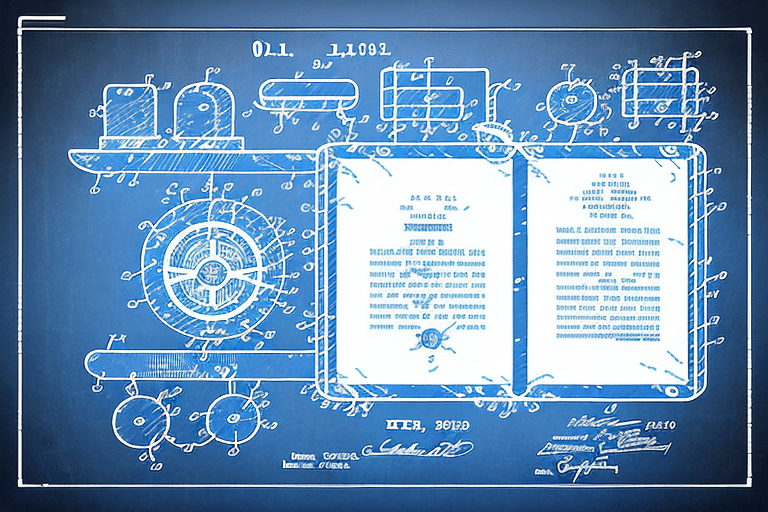In today’s rapidly evolving digital landscape, the need for on-demand intellectual property (IP) services has become increasingly important. Companies and individuals alike are seeking efficient and convenient ways to protect their innovations and secure their competitive advantage. To navigate this complex field, it is essential to understand the fundamentals of patents, the significance of the Manual of Patent Examining Procedure (MPEP), and the role of the Patent Bar. This article aims to delve into these topics, providing a comprehensive exploration of on-demand IP services.
Understanding On-demand IP Services
What are On-demand IP Services?
On-demand IP services refer to the digital platforms and tools that facilitate the management and protection of intellectual property assets. These services allow individuals and businesses to access expert advice, conduct patent searches, file applications, and handle various other aspects of IP protection conveniently and efficiently.
On-demand IP services have emerged as a game-changer in the field of intellectual property. With the increasing importance of innovation and creativity in today’s knowledge-based economy, these services have become essential for individuals and businesses looking to safeguard their ideas and creations.
The Evolution of On-demand IP Services
Over the past decade, technological advancements have transformed the way we access and utilize information. This digital revolution has significantly impacted the field of IP services, enabling the development of on-demand platforms tailored to meet the specific needs of innovators, entrepreneurs, and corporations.
Prior to the emergence of on-demand IP services, individuals and businesses faced numerous barriers and challenges in protecting and managing their intellectual property. Traditional approaches often involved lengthy and costly processes, hindering the accessibility and efficiency of IP protection.
However, with the advent of on-demand IP services, these barriers have been overcome. Now, individuals and businesses can easily navigate the complexities of IP protection, thanks to user-friendly platforms that provide step-by-step guidance and support.
Furthermore, on-demand IP services have also democratized access to expertise. In the past, only large corporations with substantial resources could afford to hire IP attorneys and consultants. Today, however, even startups and small businesses can tap into the knowledge and experience of IP professionals through these services.
The Impact of On-demand IP Services on Businesses
On-demand IP services have revolutionized the way businesses approach innovation and intellectual property protection. These services provide a level playing field for startups and small businesses, enabling them to compete with larger corporations by efficiently protecting their inventions and creations.
Moreover, on-demand IP services offer businesses the opportunity to streamline their operations and enhance their decision-making processes. By leveraging these services, companies can gain valuable insights into patent landscapes, identify potential infringers, and make informed strategic decisions regarding their intellectual property assets.
For startups and small businesses, on-demand IP services can be a game-changer. These services enable them to focus on their core competencies and leave the complexities of IP protection to the experts. By outsourcing IP management to on-demand platforms, businesses can save time, reduce costs, and ensure that their intellectual property is adequately protected.
Additionally, on-demand IP services also foster collaboration and knowledge-sharing among innovators. These platforms often feature forums and communities where individuals can connect with like-minded professionals, exchange ideas, and seek advice. This collaborative environment not only encourages innovation but also helps individuals and businesses stay updated with the latest trends and developments in their respective industries.
In conclusion, on-demand IP services have transformed the landscape of intellectual property protection. With their user-friendly interfaces, cost-effective solutions, and democratized access to expertise, these services have made IP protection more accessible and efficient for individuals and businesses alike. By leveraging on-demand IP services, businesses can not only safeguard their intellectual property but also unlock new opportunities for growth and success.
A Deep Dive into Patents
The Basics of Patents
A patent is a legally granted exclusive right that allows inventors to protect their innovations from being used, sold, or reproduced without their permission for a specific period. Patents serve as a crucial tool in fostering innovation by encouraging inventors to disclose their inventions in exchange for the monopoly rights granted by the patent.
When it comes to patents, there are several important elements to consider. One of these is novelty, which means that the invention must be new and not previously known or available to the public. This ensures that patents are granted for truly innovative ideas.
Another essential element is non-obviousness. This means that the invention must not be an obvious improvement or combination of existing technologies. It should involve a level of creativity and inventiveness that would not be obvious to someone skilled in the field.
Usefulness is also a key requirement for obtaining a patent. The invention must have a practical application and provide some kind of benefit or advantage. It should not be purely theoretical or abstract.
The Role of Patents in On-demand IP Services
Patents play a pivotal role in on-demand IP services as they form the foundation of intellectual property protection. These legal rights enable individuals and businesses to safeguard their inventions and creations, giving them a competitive advantage in the marketplace.
Within the realm of on-demand IP services, patents are essential for conducting comprehensive patent searches, assessing the patentability of inventions, and drafting persuasive patent applications. Patent searches involve exploring existing patents and other sources of prior art to determine if an invention is truly novel and non-obvious.
Assessing the patentability of inventions requires a deep understanding of patent law and the ability to analyze the technical aspects of an invention. This involves evaluating whether an invention meets the requirements of novelty, non-obviousness, and usefulness.
Drafting patent applications is a complex process that requires precise language and a detailed description of the invention. A well-drafted patent application is crucial for obtaining a strong patent that can withstand scrutiny and provide effective protection.
Moreover, patents serve as valuable assets that can be monetized through licensing or enforcement strategies. Licensing allows inventors to grant others the right to use their patented inventions in exchange for royalties or other forms of compensation. Enforcement involves taking legal action against those who infringe on the patent rights, seeking damages or injunctions to stop unauthorized use.
How to Apply for a Patent
Filing a patent application requires a deep understanding of the intricacies of patent law and a thorough knowledge of the specific requirements set forth by patent offices.
An effective on-demand IP service provides comprehensive guidance and assistance throughout the patent application process. This includes conducting detailed prior art searches, drafting patent claims, and navigating the complex landscape of patent prosecution.
Prior art searches involve examining existing patents, scientific literature, and other sources to determine if an invention is truly novel and non-obvious. This helps ensure that the patent application stands a better chance of being granted.
Drafting patent claims is a critical step in the application process. Patent claims define the scope of protection that the inventor is seeking. They must be carefully crafted to be broad enough to cover potential infringements while also being specific enough to meet the requirements of patent law.
Patent prosecution refers to the process of communicating with the patent office, responding to any objections or rejections, and ultimately securing the grant of a patent. This can involve complex legal arguments and negotiations with patent examiners to overcome any objections and demonstrate the patentability of the invention.
In conclusion, patents are essential for protecting and monetizing inventions. They provide exclusive rights that enable inventors to control the use and commercialization of their innovations. On-demand IP services play a crucial role in assisting inventors throughout the patent process, from conducting prior art searches to drafting persuasive patent applications.
The MPEP: A Comprehensive Guide
Understanding the MPEP
The Manual of Patent Examining Procedure (MPEP) is a fundamental resource for patent professionals and applicants. Published by the United States Patent and Trademark Office (USPTO), the MPEP provides guidance on patent examination procedures, legal principles, and best practices.
Comprising thousands of pages, the MPEP covers various topics, including patentability criteria, patent examination guidelines, and procedural requirements. Familiarity with the MPEP is essential for ensuring compliance with the USPTO’s standards and effectively navigating the patent application process.
The Importance of the MPEP in Patent Law
The MPEP serves as a crucial reference document that helps patent professionals interpret and apply patent laws. It provides comprehensive insights into the USPTO’s examination practices, ensuring consistency and predictability in the examination process.
By adhering to the guidelines outlined in the MPEP, patent attorneys, agents, and applicants can present their inventions in a manner consistent with the USPTO’s requirements, increasing the likelihood of a successful patent application.
Navigating the MPEP for On-demand IP Services
For on-demand IP service providers, having a robust understanding of the MPEP is essential to ensure the delivery of accurate and reliable services. A thorough familiarity with the MPEP enables these providers to efficiently conduct patent searches, draft applications, and navigate the complexities of patent prosecution. Furthermore, it allows them to stay up-to-date with the latest developments in patent law and adapt their services accordingly.
The Patent Bar: What You Need to Know
The Role of the Patent Bar in IP Law
The Patent Bar comprises individuals who have passed the rigorous examination administered by the USPTO. These registered patent practitioners possess the technical knowledge and legal expertise required to represent clients before the USPTO in patent matters.
Hiring a registered patent attorney or agent is crucial for individuals or businesses seeking professional assistance in navigating the intricacies of the patent system. Their expertise ensures that patent applications are accurately prepared, increasing the chances of obtaining robust patent protection.
Preparing for the Patent Bar Exam
Passing the Patent Bar Exam is a significant milestone for individuals aspiring to become registered patent practitioners. It requires a comprehensive understanding of patent laws, regulations, and procedures.
To prepare for the exam, candidates should engage in extensive study, review past exam questions, and take advantage of available resources, including study guides and practice exams. By thoroughly preparing for the exam, individuals can acquire the necessary knowledge and skills to excel in the field of on-demand IP services.
The Impact of the Patent Bar on On-demand IP Services
The Patent Bar plays a vital role in maintaining the quality and integrity of on-demand IP services. Registered patent practitioners help ensure that patent applications and related activities adhere to the highest professional standards.
For on-demand IP service providers, collaborating with registered patent practitioners enhances the credibility and reliability of their services. These practitioners bring in-depth knowledge and experience, enabling providers to offer comprehensive and accurate assistance to their clients.
In conclusion, on-demand IP services have reshaped the way individuals and businesses protect their inventions and creations. By understanding the basics of patents, the value of the MPEP, and the significance of the Patent Bar, individuals can navigate this complex landscape with confidence. Whether seeking IP protection for a cutting-edge invention or leveraging the power of intellectual property assets, on-demand IP services provide the tools and resources necessary to succeed in today’s innovation-driven world.











